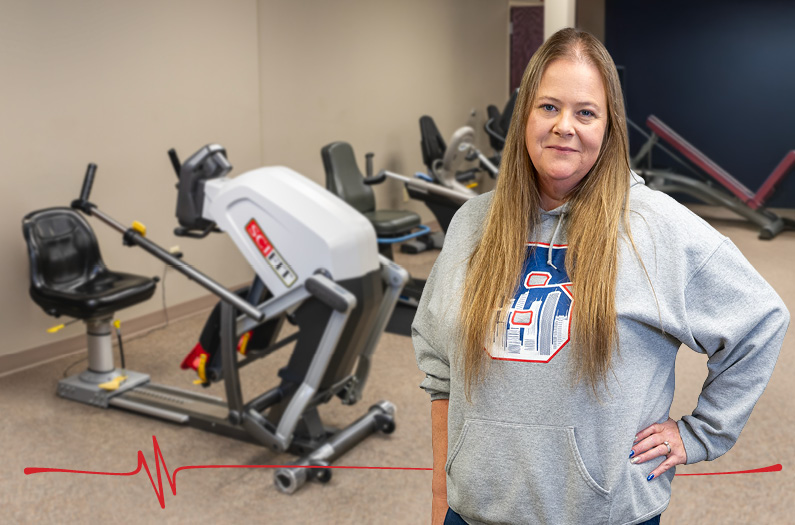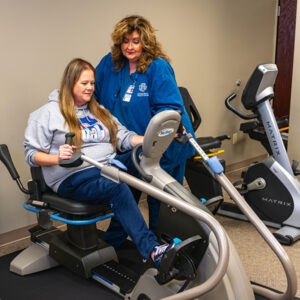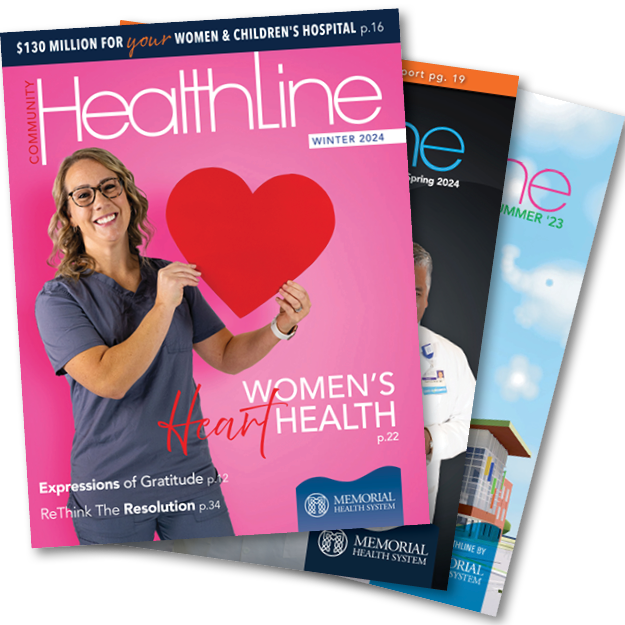Guided by Instinct, Saved by Teamwork
A Mother’s Journey through Cardiac Care

What started as a typical day on May 15, 2024, ended as anything but typical when 42-year-old mother of four, Rikki Barre, noticed something wasn’t quite right after spending most of her day with back pain. As many people would, Rikki originally assumed her pain was a result of something she had done early in the day, so she took some ibuprofen and continued as normal.
As the pain in her back worsened, Rikki’s symptoms started to evolve into something incredibly concerning when nausea and cold sweats swept over her body. Now knowing that something was very wrong, she called for her husband and told him she needed to get to the emergency room. “Normally, I would’ve just ignored it,” Rikki shares, “but it was enough that night that I thought to myself ‘Maybe we should get this checked out.’”
Upon arrival at the Belpre Emergency Department (ED), Rikki was immediately met with prompt, professional care. As soon as she voiced her concerns at the registration desk, the care team wasted no time, and Rikki was ushered into the back for an EKG. From that moment onward, things began to progress quickly as Rikki’s condition deteriorated—“Within three minutes of arriving, I had an EKG, and within 10 minutes of arriving at the emergency department, I was coding.”
The next 35-plus minutes of Rikki’s time in the Belpre ED were critical as her care team worked swiftly to stabilize her before her body sustained lasting damage.
“I have some memories,” she shares. “I remember the monitors… I remember them pressing on me with the CPR and it being uncomfortable, but I don’t remember their names or even their faces—I just know that the fact I can even remember any of that means they were amazing.”
When recounting her experience before arriving at Marietta Memorial Hospital (MMH), Rikki’s voice is filled with awe and respect as she describes how “amazing” the ED staff handled her situation. “They didn’t second guess me,” she explains. “There was no hesitation. I wouldn’t have survived if it hadn’t been for them—I never would’ve made it for the stent.”
What Rikki did not realize at the time though, was that as soon as her care team confirmed she was suffering from a heart attack, a STEMI was immediately called and the cardio team at MMH began preparing for her arrival. An ST-elevation myocardial infarction, or STEMI, is a type of heart attack that is generally much more serious than others and has a greater risk of dangerous complications and death. Typically appearing as an acute complete blockage of a medium or large heart artery, STEMIs primarily affect the lower chambers of the heart.
According to Jason Schott, DO, Memorial Health System Director of Cardiology, he was arriving at MMH when he received another call from the Belpre ED team, this time informing him that Rikki was coding and not yet stable enough to transport to the other facility. “I asked for various medications over the phone to revive her,” states Dr. Schott, “but nothing was successful.” It was not until Dr. Schott ordered the emergency department team to administer a “clot buster” medication that Rikki thankfully regained a pulse and was soon ready for emergency transfer to Dr. Schott and his team in Marietta.
At MMH, Rikki’s situation was no better—she still was exhibiting persistent signs of a heart attack and her blocked artery had still not reopened. As soon as it was safe for her to undergo a procedure, Dr. Schott and his team took Rikki to the catheterization laboratory (or cath lab) and placed a stent to fully reopen her artery and restore the blood flow to her heart. Not long after that, Rikki began to stabilize, and her care team carefully watched as her health began to drastically improve. “She was taken off the ventilator the next morning and weaned off medications to keep her blood pressure up by mid-day,” recalls Dr. Schott. “Rikki was eager to go home to her boys.”
Within two days of her heart attack, she was moved from the ICU to a regular room, and within four days of the entire ordeal, Rikki was released home to continue her recovery with the support of her family and friends, ready to begin her healing journey with cardiac rehabilitation.

Designed to assist patients with heart disease, heart attacks, or other heart-related disorders resume an active lifestyle, Memorial Health System’s nationally certified Cardiac Rehabilitation Program played a major role in Rikki’s successful recovery.
Beginning a little over a month after her heart attack, Rikki’s cardiac rehab schedule was consistent: 35 minutes of light exercise, monitored mhsystem.org 19 by a nurse, three times a week for 36 sessions. “What’s the point of surviving this and going through all of this to not do your cardiac rehab and get back to your optimal self?” she exclaims when asked about the time that goes into rehab. “That’s what we all want to do—to get back to what we were doing before all of this, and things like cardiac rehab are how you get there.”
Described by Rikki as a fun and safe atmosphere, those 35 minutes of cardiac rehab quickly became one of her favorite parts of the week— and not just because she noticed improvements in her physical health.
Gaye Jarvis, a registered nurse with the cardiac rehab program, shares that cardiac rehab is incredibly transformative for patients. She describes how the rehab team witnesses more than just a buildup of patient stamina and heart disease knowledge—they get a front-row seat to the emotional support patients offer each other.
“We have so much to offer one another,” Rikki explains. “So we laugh, and we joke, and we encourage each other.”
And this encouragement is obvious to others, with Gaye describing Rikki as someone who remained positive throughout her treatment, someone who was eager to build up the confidence of her fellow patients by sharing her story.
And while the social aspect of rehab has been an encouragement to Rikki’s mental health, she also cannot deny how helpful it has been in rebuilding her strength. Describing herself prior to rehab, Rikki shares that just walking into the building for her sessions was exhausting, so the progress made during those months was undeniable. “It was not easy,” she jokes, “but if I can put up with CPR for 35 minutes, then I can ride on an exercise bike for 35 minutes!”
Today, Rikki looks back on May 15th with a sense of slight disbelief. Having been to the doctor only a month before her heart attack, Rikki and her primary care provider are still shocked that it even happened. And while she explains that there were no obvious warning signs, Rikki does admit that in hindsight, this possibly wasn’t her first cardiac event. “I think that this was actually the third time that something like this has happened,” she explains, “but I didn’t realize it at the time because it wasn’t as severe, and I didn’t know I was experiencing symptoms.”
According to the American Heart Association though, Rikki’s experience isn’t unusual. Heart disease is currently categorized as the #1 killer of women in the United States, but most women contribute their symptoms to “less life-threatening conditions” like acid reflux, the flu, or just regular aging. This confusion can largely be attributed to the fact that women are more likely than men to experience multiple symptoms when suffering from a heart attack, and that, like Rikki, as many as 40% of women who have heart attacks have no chest pain whatsoever.
At the end of the day though, Rikki reflects on her experience with sincere appreciation and gratitude for everyone involved in her care.“I walked away with minimal if any damage to my heart and no brain damage,” she shares. “I was able to return to my family in as good, if not better, condition than I was when I walked out the door of my house that night. They saved my life.”
Featured From This Issue
-
Winter 2024
Osteoarthritis: Causes, Symptoms, and Treatment Options
-
Winter 2024
Maintaining Your Primary Care Relationship
-
Winter 2024
One Year of Exceptional Pediatric Care
-
Winter 2024
Cultivating Kindness
-
Winter 2024
OBGYN: The Easiest & Best Choice
-
Winter 2024
Echoes of an Event to Remember
-
Winter 2024
A Trip No Parent Should Have to Make
-
Winter 2024
Together, We Can Make a Difference.
-
Winter 2024
A Family’s Journey with Memorial Health System
-
Winter 2024
Life Changing Healthcare
-
Winter 2024
From Care to Commitment
-
Winter 2024
Expressions of Gratitude: What’s Your Story?
-
Winter 2024
Rethink the Resolution
-
Winter 2024
Our Continued Commitment to You




